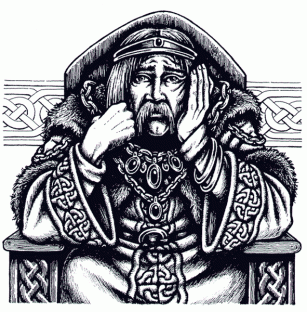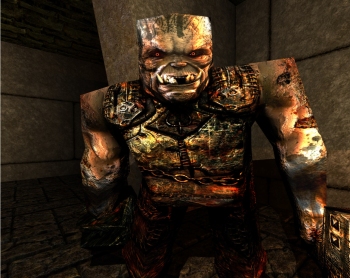When the prince begins his quest, things look pretty hopeless. The kingdom is devastated, the government paralyzed. The ogre burns and pillages at will; his magical power, cruelty, and greed represent an alternative to the “legitimate” order. Like the king, the ogre has a castle, treasure, and lands; he’s set up on his own, and he’s making a go of it. He may be horrible, but he has a certain charisma; the king seems bland and faceless by comparison. Their conflict amounts to a civil war, in which the people on both sides come out losers. The whole situation, we might say, represents a failure of the adult world—the world of citizenship—to fulfill its responsibilities for protecting and nurturing the community.

Look first at the king. He’s not getting good advice. His NSA can’t figure out the ogre or his magic. His Defense Department can’t protect the realm. Not only that, but he’s desperate enough to put his daughter up for sale. What kind of a father does that? No wonder he’s depressed. Still, he does try to rule and it’s to his credit that he has a daughter in the first place. He may be an ineffectual king, but he does have a trace of humanity.
Basically, the king fails to understand the relation between power and authority. He has come by his office through inheritance, which may make him legitimate but cannot deliver obedience or order in the realm. Believing that right makes might, he has failed to learn the lessons of King Lear and Machiavelli (unlike the Prince, he does not seem to have taken World Civ). The king believes that authority confers power, whereas in fact power is something that is granted by the people he governs; it represents a gift from the general will. That’s why newly minted second lieutenants or deans so often run into trouble with their constituents. “Pulling rank” only reveals their desperation and lack of leadership. To gain power and exert leadership, you have to convince the people that you have their best interests at heart and possess the skills necessary to protect and deliver. Administration is all about dealing with people.

Now consider the ogre. In many respects he seems the opposite of the king. He has no family; he’s greedy and cruel, a real bully. Moreover, he’s gained his power by separating his soul from his body. The motif of the external soul occurs frequently in heroic tales across cultures; it makes one invincible, but at the price of one’s humanity. Modern-day versions include the pact Faust makes with the Devil in Goethe’s drama or Mann’s novel, Sauron’s Ring of Power in Tolkien’s epic fantasy, or the horcruxes of Voldemort, the evil wizard in the Harry Potter books, who tries to escape mortality by splitting his soul and encasing the pieces in various objects. Each of these antagonists gain demonic, single-minded power but have to give up the ability to change, grow, love, or learn. These desperate individuals all embrace the “fixed mind” of Milton’s Satan. Like him they care more about their career than anything else, and they always choose power over love.
Like the king, the ogre is a failed citizen, because he cares more about himself than anyone else. He can’t govern; he can only terrorize. He can’t run a kingdom, he can only destroy one. Believing that might makes right, he focuses entirely on strengthening his own position: taking prisoners, amassing wealth, defending his fortress, and pursuing his goal with demonic single-mindedness. But if you split off your soul from your self and encase it in some object of desire, such as a talisman or a career, then you can’t adapt to changing circumstances, you lose your nimbleness and flexibility, and above all you cut yourself off from other people and the information or wisdom they might provide. When the Wheel of Fortune begins to turn, no one will come to your aid. But of course the ogre has had so much initial success that he has forgotten all about Fortune. He believes that he’s invincible, that the usual rules no longer apply. And so, like the Dark Lord Sauron, he fails to imagine that someone small and inconspicuous could penetrate his defenses and seize hold of his precious soul.
Of course, neither the king nor the ogre even notices the old woman or dreams that she might hold the key.
